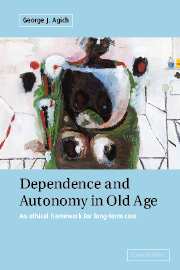5 - A phenomenological view of actual autonomy
Published online by Cambridge University Press: 31 October 2009
Summary
Philosophical treatments of autonomy typically rely on idealized examples that are far removed from the ordinary actions that make up everyday experience. The ethical problems associated with long-term care, however, extend far beyond these examples into a domain of experience that makes up everyday life. Actual autonomy is manifested not in such rarified examples, but in the everyday actions in the shared world of social life. The features of actual autonomy are to be found not in distinctive decision-making nodes, but in the interstitial features of everyday life (Agich 1995a). Once we appreciate the interdependent character of being an autonomous agent in the world, the implications of autonomy for long-term care can be discussed without being restricted to the ideals of independence and noninterference. This chapter develops some general features of the social world and what it means to be a person existing in that world. Autonomy is seen as a core feature of persons in this view, but persons are seen as essentially connected with, rather than isolated from, others and the world. Four exemplary aspects of the phenomenology of the social existence of persons are particularly relevant to autonomy in long-term care: the spatial, temporal, communicative, and affective dimensions. Implications for long-term care are drawn for each of these dimensions of social action. This discussion thus provides a basic framework for reassessing and reconceptualizing the problems associated with autonomy in long-term care.
- Type
- Chapter
- Information
- Dependence and Autonomy in Old AgeAn Ethical Framework for Long-term Care, pp. 125 - 164Publisher: Cambridge University PressPrint publication year: 2003



